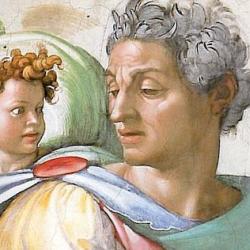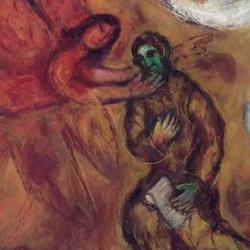Sermon outline for Second Sunday in Advent:
God For Us
INTRODUCTION
Last week, we meditated on the fact that God became flesh. This week, we will make that more specific. The incarnation is an event in human history, but more specifically in the history of Israel. When the Son of God became flesh, He became Jewish flesh.
And that means that the incarnation is all mixed up with God’s choice or election, of Israel. The Son of God entered the world as the culmination of Yahweh’s election of Israel, as the “Elect One” (Isaiah 42:1).
THE TEXT
“Behold! My Servant whom I uphold, My Elect One in whom My soul delights! I have put My Spirit upon Him; He will bring forth justice to the Gentiles . . . .” (Isaiah 42:1-25).
THE CHOSEN PEOPLE
Scripture characterizes God unique relationship to Israel in a number of ways, but we will focus on one of those today: election. Israel is the chosen people, the elect people. In the OT, Yahweh’s election of Israel is described in a number of metaphors:
-Yahweh as Warrior chooses or “recruits” Israel as His army and fights with and for them (Exodus 14:25; 15:3; Psalm 60:8-9; Isaiah 13:3-4; cf. Exodus 17:9).
-Yahweh as Husband chooses and “takes” Israel as His bride and enters a marriage covenant with her (Exodus 6:7; Deuteronomy 4:34-37; Jeremiah 31:31-32).
-Yahweh as Father chooses and adopts Israel as His son, delivers His son, and gives him the inheritance of the land of promise (Exodus 4:22-23; Jeremiah 31:9).
-Yahweh as Architect builds and “makes” Israel in electing them (Deuteronomy 32:6; 1 Samuel 12:22).
-Yahweh as Farmer plants Israel in the land of promise (Exodus 15:17).
CHOSEN-REJECTED-RESTORED
As each of these metaphors develops in the OT, Yahweh’s election is the beginning of a story of election, rejection, and restoration.
-Yahweh fights against Egypt for Israel; but when Israel seeks help from foreign nations He fights against Israel (2 Kings 16:1-10; Jeremiah 21:5). In the restoration, He begins to fight for His people again (Isaiah 13:17-19).
-Yahweh chooses Israel as bride, but rejects her for her promiscuity; after casting her aside, however, He woos her back (Hosea 1-3).
-Yahweh adopts Israel as His son and gives an inheritance, but when Israel abuses that inheritance they are cast out of the land; in the end, Yahweh restores the inheritance to His son, the “sons of Israel” (Jeremiah 16:14-15).
-Yahweh builds Israel, but then tears her down in the exile. Ultimately, He rebuilds (Jeremiah 24:6).
-Yahweh plants Israel in the land, but then uproots her and leaves the vineyard to be desolated by Israel’s enemies (Psalm 80:8-19; Isaiah 5:1-7; Jeremiah 1:10). But Yahweh promises that Israel will be replanted (Jeremiah 24:6; Ezekiel 36:1-15).
Election is the starting point for each of these overlapping stories. Election is also the driving force throughout the story. Why does Yahweh fight again for Israel? Why does He woo His unfaithful bride back to Himself? Why does He give the land back to His son? Why does he rebuild and replant? The answer to all these questions is the same: Yahweh restores Israel because He loved her and chose her, loved her and chose her out of His free grace (Deuteronomy 7:7). His choice, His election is His fixed and unalterable determination to do good to His people. Election means that, though thick and thin, through rebellion and resistance, God is for Israel (Isaiah 41:8-9; cf. Romans 11:28-29).
THE CHOSEN ONE
In the OT, certain individuals were “chosen” by Yahweh, particularly priests (1 Samuel 2:28) and kings (1 Samuel 7:14; 1 Chronicles 28:4, 6). These were considered “elect” because they were representatives and heads over the “chosen people.” Likewise, Jesus is the chosen priest and king because He is Head of the true Israel. Scripture reveals that Jesus is the “chosen servant” (Matthew 12:18; cf. Isaiah 42:1), the true Israel (Acts 13:17; cf. Deuteronomy 7:7), though mocked by Israel as the rejected one (Luke 23:35). Like Israel, Jesus is the paradigmatic “foolish thing” chosen by God to “confound the wise” (1 Corinthians 1:27). He embodies Israel in His own person and is the ultimate “chosen one.”
This is the point of Isaiah 42’s reference to the “Elect One.” This comes in a section of Isaiah that highlights the promise of Israel’s return from exile. Throughout the passage, the “servant” is sometimes Israel and sometimes an individual Israelite. Earlier, in Isaiah 41:8-9, Yahweh addresses the nation of Israel as “My service” and the people that has been “chosen” and “not rejected.” But in 42:1, the “Elect One” is an individual. Yahweh promises to redeem and restore His “chosen people” and His “chosen Man.”
These prophecies are ultimately fulfilled in Jesus. He is the chosen Israel, whose story is foreshadowed in the OT story of Israel: It is a story of election, rejection, and restoration, a story of birth, death, and resurrection. That the Father has designated Jesus as His chosen one means that God is for Jesus.
CHOSEN IN CHRIST
The Father loved the Son from all eternity, and elected the Son as the redeemer. Jesus enters the world as the Chosen One, and those who are in the chosen one are chosen by the Father. The fact that we are chosen at all depends on the prior fact that the Father has chosen the Son and set His love on him. Ephesians 1:4 states explicitly that God “has blessed us in Christ with every spiritual blessing in the heavenly places, even as He chose us in Him before the foundation of the world.” The incarnation is the revelation of God’s electing love, first in Jesus the “chosen One,” and then toward us, those who are “chosen in Christ.”
From this perspective, election is nothing less than the gospel; election announces the good news that God is determined to reveal Himself, to make Himself known to sinful man, to save sinners. The Triune God is the One who loves in freedom, as Father, Son and Spirit live in an eternal communion of love and fellowship. The gospel is God’s determination and decision for man, His fixed determination that He is not just the free God of love in Himself. He has chosen us in Christ as His army and He will fight for us; He has taken us as His bride and will love us; He has adopted us as His sons and will give us our inheritance; He has built us as His house and will adorn us; He has planted us as His garden and will tend us. He devotes all his infinite resources to promote the good of His people. The Incarnation means that He is the free God of love for us.










